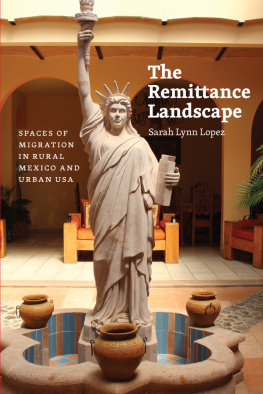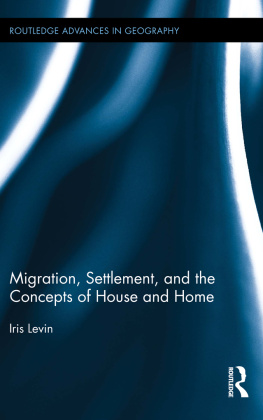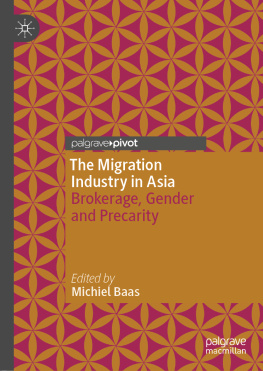2014 by Board of Trustees of the Leland Stanford Junior University.
All rights reserved.
No part of this book may be reproduced or transmitted in any form or by any means, electronic or mechanical, including photocopying and recording, or in any information storage or retrieval system without the prior written permission of Stanford University Press.
Printed in the United States of America on acid-free, archival-quality paper
Library of Congress Cataloging-in-Publication Data
Schmalzbauer, Leah, author.
The last best place? : gender, family, and migration in the new west / Leah Schmalzbauer.
pages cm.
Includes bibliographical references and index.
ISBN 978-0-8047-9165-6 (cloth : alk. paper)
ISBN 978-0-8047-9293-6 (pbk. : alk. paper)
1. Migrant laborMontana, WesternSocial conditions. 2. Migrant laborMontana, WesternEconomic conditions. 3. Migrant laborers familiesMontana, WesternSocial conditions. 4. Migrant laborers familiesMontana, WesternEconomic conditions. 5. Foreign workers, MexicanMontana, WesternSocial conditions. 6. Foreign workers, MexicanMontana, WesternEconomic conditions. 7. Montana, WesternSocial conditions 8. Montana, WesternEconomic conditions. I. Title.
HD5856.U5S27 2014
305.868'7207865'dc23
2014010115
ISBN 978-0-8047-9297-4 (electronic)
Typeset at Stanford University Press in 10.5/13 Bembo
ACKNOWLEDGMENTS
I want to thank, first and foremost, the women, men and children who participated in this project. Their openness, trust, and friendship made this book possible, and transformed me as a person and a scholar. I hope this book will do justice to their strength, struggles and aspirations.
One of the most meaningful aspects of this project was partnering with community groups and individuals committed to immigrant rights in Montana. I thank the Coalition of Resource Organizations (CORO), under the leadership of Buck Taylor, which provided the spark for this project. I am grateful for the activism of Kim Abbott and Bethany Letiecq of the Montana Human Rights Network, and for that of Shahid Haque-Hausrath, who created the Montana Immigrant Justice Alliance (MIJA) and who provides accessible, social justicebased legal services to Montanas immigrant community. I also thank Shahid for generously answering my queries as I wrote the chapter on illegality. Thank you to Katie Gray for the hundreds of hours she has put into informal social work on behalf of the participants in this study, for reading drafts of my work to make sure participants identities were adequately concealed and for assisting me with youth interviews. I am grateful to Courtney Wosepka whose outreach work with migrant farmworkers introduced me to the world of H2A workers. Thank you to the Bozeman Childrens Museum and Hopa Mountain for their outreach to Latino youth in the Gallatin Valley. Special thanks to my dear friends Bridget Kevane and Hunt McCauley, whose commitment to strengthening the diverse fabric of southwest Montana inspired me to write on hope and opportunity. Hunt also provided me invaluable research assistance, linking me with agricultural families and talking with me through many aspects of migrant life in Montana. Thank you also to my students Jenna and Jessa Thiel, Lilia Guillen-Sanchez, Frances Moore, Ashley Piper, Yanet and Oneida Eudave and Jessica Cartwright for their steadfast work in bridging Montana State University and the Latino community.
I am fortunate to have received generous institutional support for this project. I thank the Office of the Vice President of Research at Montana State University (MSU), which granted me funds to support the research, analysis and writing phases of this project. I also thank the office of the dean of the College of Letters and Science, which gave me a semester of pretenure teaching release to pursue my fieldwork. Heartfelt thanks to my MSU colleagues in the Department of Sociology and Anthropology, who nurtured me professionally over the course of this project. Special thanks to David Eitle, whose mentorship was invaluable. Thank you to the American Sociological Association Fund for the Advancement of the Discipline, which supported the early phases of this research, and to the American Sociological Association Community Action Research Initiative-Spivak Program for supporting community-based know your rights forums for the participants in this study. I wrote the first draft of this manuscript while a visiting scholar at CIESAS-Pacfico Sur in Oaxaca, Mexico. I thank them, and especially Alejandra Aquino Moreschi, for their support during that critical year. I was half-way through the writing of this manuscript when I received a job offer from Amherst College. I have since been overwhelmed by the kindness and support I have received from my new colleagues in Sociology and American Studies. I owe special thanks to Ron Lembo, Karen Sanchez-Eppler and Jerry Himmelstein, who offered great advice and guidance as I moved my manuscript to publication.
I am very grateful for the support I have received from the fabulous editorial staff at Stanford University PressKate Wahl, John Feneron and Frances Malcolm. I owe special thanks to Frances Malcolm. Since our first email exchange, she has been an enthusiastic and inspirational supporter of this project, and I truly appreciate the generous time and thought she has invested in it. My manuscript has benefited significantly from her smarts and poignant insights. Thank you also to the anonymous reviewers, whose thoughtful feedback no doubt made this a stronger book.
I am incredibly lucky to have wonderful friends who share my passion for research and writing. I thank Bridget Kevane, Sara Rushing and Yanna Yannakakis, who, in different combinations, have composed my writing circle and so much more over the past eight years. Their friendship, laughter, honesty, love of food and wine, and solidarity in motherhood energized my writing and kept me balanced and smiling. Thank you to Juliet Schor, whose mentorship and guidance I drew on in each phase of this project, and whose support and friendship I cherish. Thank you also to Linda Young, Frances Lefcort and Adele Pittendrigh for their friendship and mentorship. Thank you to Aiden Downey for his writing support and unique insights into the art of ethnography. Thank you also to Abigail Brooks and Patricia Arend, who offered encouragement at critical points in this project. I am deeply appreciative of the support of Joanna Dreby, who was almost always the first person I turned to for manuscript-related advice, and whose work has influenced my own in a myriad of ways. I also thank Leisy Abrego, Tanya Golash-Boza, Hung Cam Thai, and especially Cecilia Menjvar who provided helpful advice as I completed my manuscript and moved it to publication.
I am so appreciative of the support of my family. I thank my in-laws Philip and Ellie Bruner for their genuine interest in my research, and for their love and generosity. I thank my siblings-in-law and my stepfather, Jim Sparks, Rick Bruner, Carolyn and Ben Opps, and Vincent Graziano for making me laugh and for reminding me that there are many ways in which to see the world. I thank my sister, Anna Schmalzbauer, for being a constant source of love, encouragement and friendship. I thank my nieces and nephews, Victor and Olympia Schmalzbauer Sparks and Maizy Opps, for being just plain awesome. I thank my dad, Gary Schmalzbauer, for his humility, generosity and unconditional love, all of which have indelibly shaped me as a person and sociologist. I also thank my dad for his partnership in our unforgettable drive through central Mexico. My mom, Leone Medin, was integral to this project. I thank her for the times she accompanied me in the field, for reading every word of every draft of every chapter of this book, and for giving me invaluable feedback. I thank her for sharing with me her experiences of growing up as the only daughter in a poor Minnesota farm family, which gave me powerful insights into gender, generation and rural life. Most important, I thank my mom for her love, unwavering support and friendship.




